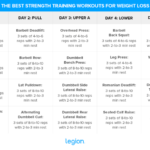Weight Training For Health offers a transformative approach to wellness, extending far beyond mere muscle building. This comprehensive guide explores the profound impact of weight training on cardiovascular health, bone density, metabolic function, and mental well-being. We delve into designing safe and effective programs, addressing specific health conditions, and dispelling common myths surrounding this powerful modality. Discover how to harness the benefits of weight training to achieve optimal health and vitality.
From crafting a beginner-friendly workout plan to understanding the nuances of proper form and progressive overload, we cover all aspects of safe and effective weight training. We also address how to adapt programs for individuals with specific health concerns, such as arthritis, diabetes, or back pain. Nutritional strategies for muscle growth and recovery are explored, alongside practical advice on debunking pervasive myths about weight training and its suitability for various age groups and fitness levels.
Nutrition and Recovery for Weight Training: Weight Training For Health

Optimizing nutrition and recovery is paramount for maximizing the benefits of weight training. A well-structured nutritional plan, coupled with adequate rest, significantly impacts muscle growth, strength gains, and overall physical well-being. Neglecting these crucial elements can hinder progress and potentially lead to injury.
The Role of Macronutrients in Muscle Growth and Recovery
Protein, carbohydrates, and fats—the macronutrients—play distinct yet interconnected roles in supporting weight training goals. Protein serves as the primary building block for muscle tissue repair and growth. Carbohydrates provide the essential energy source fueling workouts and replenishing glycogen stores depleted during training. Fats, often overlooked, are crucial for hormone production, nutrient absorption, and overall cellular function. A balanced intake of all three is vital for optimal results.
Sample Balanced Meal Plan for Weight Trainers
A sample meal plan could include a breakfast of oatmeal with berries and a protein shake, a lunch of grilled chicken salad with quinoa, and a dinner of lean beef with roasted vegetables and brown rice. Pre- and post-workout snacks, such as a banana with peanut butter or a protein bar, can further optimize energy levels and recovery. The specific caloric and macronutrient needs will vary depending on individual factors like body weight, training intensity, and goals.
Consulting a registered dietitian or sports nutritionist can provide personalized guidance.
Hydration and Sleep’s Impact on Muscle Recovery
Adequate hydration is critical for numerous bodily functions, including muscle recovery. Water helps transport nutrients, regulate body temperature, and remove metabolic waste products. Dehydration can impair performance and hinder recovery. Sleep is equally vital; during sleep, the body repairs and rebuilds muscle tissue. Insufficient sleep disrupts this process, negatively impacting muscle growth and strength gains.
Aim for 7-9 hours of quality sleep per night.
Foods Supporting Muscle Growth and Recovery, Weight Training For Health
A balanced diet rich in the following foods can significantly support muscle growth and recovery:
- Lean protein sources: Chicken breast, fish, turkey, lean beef, eggs, Greek yogurt, lentils.
- Complex carbohydrates: Brown rice, quinoa, sweet potatoes, oats, whole-wheat bread.
- Healthy fats: Avocado, nuts, seeds, olive oil.
- Fruits and vegetables: Provide essential vitamins and minerals.
Ultimately, Weight Training For Health is not just about building bigger muscles; it’s about building a healthier, stronger, and more resilient you. By understanding the science behind weight training and applying the practical strategies Artikeld in this guide, individuals can unlock a wealth of physical and mental benefits, leading to a more fulfilling and active life. Remember to consult with a healthcare professional before starting any new exercise program, especially if you have pre-existing health conditions.

